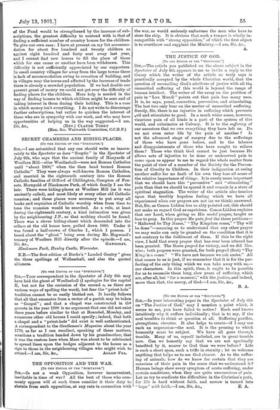THE JUSTICE OF GOD.
[To THE EDITOR OF THE "SPECTATOR.") Sin,—The article you published on the above subject in the Spectator of July 6th appears to me to invite a reply to the theory which the writer of the article so truly says is practically accepted by the whole Christian world, that the question of reconciling God's attribute of justice with all the unmerited suffering of this world is beyond the range of human intellect. The writer of the essay on the problem of pain in "Lux Mundi " points out that pain has many uses. It is, he says, penal, corrective, preventive, and stimulating. The last two only bear on the matter of unmerited suffering. Surely, Sir, there is no injustice in suffering which prevents evil and stimulates to good. In a much wider sense, however, vicarious pain of all Ends is a part of the system of this world, and culminates at Calvary. It is to the suffering of our ancestors that we owe everything they have left U8. Do we not even enter life by the pain of another ? Is not the advanced stage of surgery due to the sufferings of those who have gone before, and to the labours and disappointments of those who have sought to relieve them? Those who think Goa cannot be just because He allows acts of injustice to be done or undeserved pain to come upon us appear to me to regard the whole matter from the point of view of a member of the Society for the Preven- tion of Cruelty to Children. In their indignation at seeing another suffer for no fault of his own they lose all sense of the relative importance of things. It is surely more important that we should have this " preventive " and " stimulating " pain than that we should be spared it and remain in a state of spiritual stagnation. The writer of the article also touches upon that terribly hopeless feeling which we have all experienced when our prayers are not (as we think) answered. But, Sir, as Canon Liddon has so ably pointed out, this should not make us regard God as capricious. Canon Liddon explains that our Lord, when giving us His model prayer, taught us how to pray. In this prayer He puts first the three petitions— "Hallowed be Thy Name," "Thy Kingdom come," "Thy will be done "—meaning us to understand that any other prayer we may make can only be granted on the condition that it is not contrary to the fulfilment of them. If this be the right view, I hold that every prayer that has ever been uttered has been granted. The Boers prayed for victory, and we did like. wise; both prayers were granted, for both prayed (first) "Thy Kingeo.n come." "We have not because we ask amiss." All that comes to us is just, if we remember that it is for the per- fecting of the only thing which we can take away with us,— our characters. In this spirit, then, it ought to be possible for us to reconcile these long, slow years of suffering, which are, after all, but "for a moment," with the justice, and indeed, more than that, the mercy, of God.—I am, Sir, &c.,
B. A.






































 Previous page
Previous page